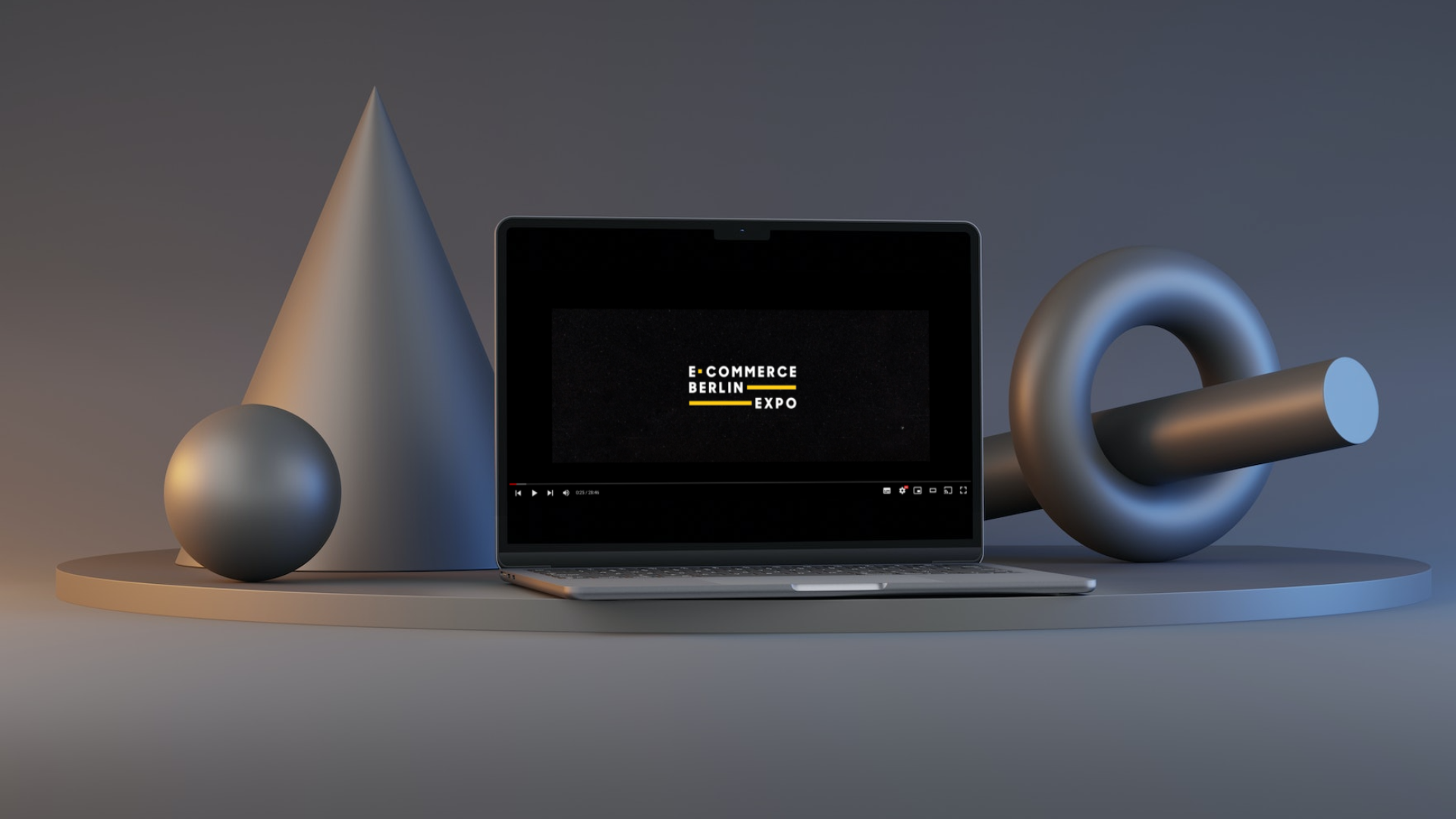Play it Again, Sam: Evergreen Top EBE2020 Presentations
Written by
Kinga EdwardsPublished on

If you’ve been yearning for a nostalgic trip down memory lane, reliving the magic of the extraordinary E-commerce Berlin Expo, then you’re in for a treat. In this blog post, we’re delighted to present a curated selection of the evergreen top presentations from EBE2020 that have stood the test of time.
Just like the timeless line “Play it again, Sam” from the classic movie Casablanca, these exceptional presentations continue to captivate, inspire, and provide valuable insights in the event industry.
#1 Co-marketing & Retail Media in Douglas
The presentation by Max Melching – Bereichsleiter Online Marketing, Douglas.
DOUGLAS pushes its e-Commerce growth even further and beyond retail thanks to a new Retail Media business and a marketplace. Therefore the collaboration with brands and manufacturers becomes even more important. Retail media channels like sponsored product ads or co-marketing efforts like shopping campaigns with partners by Google are a huge opportunity for almost every retailer and brand to generate highly profitable growth.
Key Takeaways:
- DOUGLAS is pushing its e-commerce growth beyond retail with the help of Retail Media business and a marketplace, making collaboration with brands and manufacturers more important than ever.
- Retail media channels such as sponsored product ads and co-marketing efforts like shopping campaigns with partners like Google offer significant opportunities for retailers and brands to generate highly profitable growth.
- DOUGLAS has a data management platform (DMP) in place since 2018, which enables them to collect both online and offline customer data, creating a more comprehensive view of the customer journey.
- Using the DMP, DOUGLAS can build relevant segments for targeted advertising, providing their suppliers with a more specific and relevant audience for their products.
- DOUGLAS’s Retail Media business consists of three parts: off-site audience network advertising, on-site sponsored product ads, and co-marketing campaigns with brands and retailers.
- Sponsored product ads help monetize the website, providing additional revenue and profit.
- DOUGLAS aims to implement audience ads, which will use DMP segments to advertise on their website, targeting specific customer segments and increasing the effectiveness of their marketing efforts.
- Co-marketing campaigns provide opportunities for collaboration between online marketers and industry partners, creating a more streamlined and transparent process with shared access to performance reporting.
- Google’s Shopping campaigns with partners offer a solution for co-marketing, allowing retailers and manufacturers to share responsibilities, control over budget and campaign elements, and access to performance data.
- The expansion of DOUGLAS’s marketplace and Retail Media business creates new opportunities for collaboration, enabling both retailers and brands to reach a broader audience and drive profitable growth.
Watch the whole presentation:
#2 Trends and Sustainability in German E-commerce
Katharina Huke, Chief Commercial Officer at idealo, talks about recent trends in German e-commerce, such as sustainability and potential changes in user behaviour as well as the rise of online shopping events like Black Friday and the holiday shopping season. Moreover, she discusses how online shops can survive and succeed in a platform dominated world.
Key Takeaways:
- IDEALO, a price comparison website in Germany, is growing with 18 million visitors monthly, making it the fourth largest in German e-commerce. They are expanding their transactional platform to enable customers to shop conveniently and enable shops to sell to a wider audience.
- The German e-commerce market continues to grow, with a turnover of 58 billion euros in 2019. The growth rate is declining but remains strong at 9% annually, driven by online sales eating into offline retail growth.
- Fashion and consumer electronics are the two largest categories in online sales, making up over 50% of the market. The fastest growing category is fast-moving consumer goods, growing at 15%.
- Connected commerce is essential, as customers regularly search for prices online while shopping in-store. Over 50% of shoppers compare prices online when shopping in physical stores, and a third try to negotiate the price based on online information.
- Black Friday remains an important event, with significant growth in sales during the Black Friday week. Retailers are advised to take advantage of the entire week, starting from Monday, to maximize sales.
- Real discounts are offered during Black Friday, with an average discount of 5% across various product categories. Discounts are especially significant in the notebook and television categories.
- Customers are increasingly data sensitive, with 58% concerned that companies know too much about their preferences. However, over 50% are still willing to give away their data for an attractive advantage or deal.
- Personalized communication and offers are desired by customers, with 43% wanting to be addressed in a personalized way. Over 50% of customers feel annoyed by the multitude of generic offers.
- Customers appreciate the storage of personal data for payment convenience, differentiating between data usage for payment purposes and data privacy concerns.
- Retailers and e-commerce platforms should focus on personalization, balancing data sensitivity concerns and individualization preferences, to improve customer experience and maximize sales potential.
Watch the whole presentation:
#3 How to expand to new markets in 100 days
“We need to grow!” is a statement you’ve probably heard before. And there really is no reason for a business not to grow! In just 5 years, Marley Spoon brought its v to 8 markets around the world. But expanding brings challenges: Where to go? How to start? And most importantly: How to keep your team aligned and engaged along the way? Dijana Dimitrovska, Marketing MD, Marley Spoon, shares insights on how to open a new market in 100 days.
Key Takeaways:
- To determine which countries to expand to, Marley Spoon focused on four areas: market potential, industry and marketing, quality of product, and unit economics. They considered factors such as population size, competition, and profitability.
- Persuading the board was essential, but getting the team on board was even more critical. This involved being clear, having an effective kickoff meeting, and addressing the different opinions and dependencies within each department.
- To manage the project effectively, sub-project leads were designated to handle specific aspects of the expansion, such as digital operations and finance.
- The team jointly devised a critical path, breaking down every essential task and deadline for the project’s success.
- To maintain efficient communication, the team used a Slack channel and a Google Sheet as their primary modes of communication and information sharing.
- The expansion involved 63 people from the company working together, with 23 sheets connected to the main Google Sheet and 33 critical path items.
- To ensure everyone was on the same page, the team held 19 meetings throughout the expansion process, with sub-project leads providing updates from their respective departments.
- The marketing efforts in Denmark began two weeks before the launch date with a mix of approaches, including lead generation campaigns, performance-driven ads, and a raffle. Once the launch occurred, the company utilized various online channels for advertising.
- Marley Spoon received positive media coverage in two of Denmark’s largest newspapers, which helped spread the word about their unique offerings in the meal kit industry.
- After successfully expanding to Denmark, the company was able to use the experience to launch in Sweden more efficiently, taking less time and streamlining communication among team members.
Watch the whole presentation:
#4 The truth behind mass customization
Over the last decades large brands and companies were not able to unlock the full potential of mass customization. The complexity of customized products as well as the direct to consumer business challenges are main barriers. Mass customization has to be considered more than ever before as a relevant growth driver for many established e-commerce business models. A key to success is to take-out complexity through-out the end to end process. Christian Möhring, CEO & Founder at madeone, shares his own experiences with enabling customization business working for large corporations as Nike and Ikea, SMEs and his company madeone, focussed on ‘Customization as a Service’.
Key Takeaways:
- Personalization is at the core of madeone’s business model, as they tailor sports equipment to each customer’s individual needs and preferences, ensuring a unique experience.
- Madeone combines advanced technologies like 3D printing with traditional craftsmanship, providing a blend of innovation and quality that sets them apart in the sports equipment industry.
- The company utilizes customer data to make informed decisions in product development, ensuring they meet customer demands and expectations effectively.
- Working closely with professional athletes, madeone tests and refines their products to guarantee optimal performance and quality.
- By adopting a direct-to-consumer approach, madeone can maintain full control over the customer experience, quality assurance, and pricing, offering a distinct advantage in the market.
- Madeone is committed to sustainability, focusing on producing eco-friendly products, reducing waste, and implementing sustainable practices throughout their manufacturing process.
- To grow their brand and reach new markets, madeone actively seeks strategic partnerships within the sports industry, leveraging their unique value proposition.
- The company is dedicated to improving the customer journey, from product discovery and customization to delivery and after-sales support, ensuring a seamless experience.
- Madeone’s unique value proposition lies in the combination of customization, technology, and sustainability, setting them apart from competitors in the sports equipment market.
- As the company expands, Christian Möhring emphasizes the need to maintain their commitment to quality, sustainability, and customer satisfaction, in order to ensure long-term success and responsible scaling up.
Watch the whole presentation:
#5 From Market to Insights to Strategy
Looking at keywords does help SEOs & Content Marketers in eCommerce companies to figure out how to attract users to a ecommerce landing page and defines how to create content for it. But using keyword data to define an entire market incl. insight like market trends, market demand structure & share of voice is very rare. This will also lead decision makers beyond SEO & Content Marketing to more valuable & strategic business decisions and applications. In this talk Björn Darko, Director Digital Strategies Group, Searchmetrics shows how a „Market Insights Report“ can help define your entire market & industry like you have never seen before.
Here are 10 key takeaways from the discussion:
- Focus on transactional conversion triggers for products like ski helmets and jackets, while using informational content for products like suits and trousers.
- Don’t just look at short-term seasonality – analyze data from market research reports to better understand real demand and update your warehouse accordingly.
- Update your warehouse based on real demand, and use the data from market research reports to manage your warehouse stock, getting rid of underperforming products and stocking up on items with increasing demand.
- Concentrate on both running apparel and footwear, as both sectors have an increasing demand in search volume, making them promising areas to focus on.
- Media strategy – choose your partners wisely, analyze competitors and potential partners based on their share of voice and traffic index to maximize the exposure and sales potential of your products.
- Utilize informational websites and magazines for brand awareness; for example, promote yoga clothes on websites without a shopping cart, while focusing on transactional partners for products with higher conversion rates.
- Focus on social media platforms that are relevant to your specific keywords and identify which platforms to prioritize in order to effectively reach your target audience.
- Start advertising for yoga as the market is growing, the yoga market is growing at 13%, with a decreasing cost-per-click (CPC), making it a potentially profitable area to invest in.
- Impact your business with data-driven decisions – utilizing data from market research reports, you can gain executive attention, directly impact your production roadmap, and manage your warehouse stock more effectively.
- Engage with stakeholders across the organization, to fully leverage the potential of data-driven insights, engage with executives, strategic marketing teams, business leaders, and portfolio managers to gain access to the whole “iceberg” of information, rather than just the tip.
Watch the whole presentation:
Wrapping up
From industry experts sharing their knowledge to thought-provoking discussions on the latest trends, the evergreen top presentations of EBE2020 continue to captivate and inspire event enthusiasts. As we eagerly await the next edition, E-commerce Berlin Expo 2024, we anticipate even greater insights and groundbreaking ideas that will shape the future of e-commerce. Stay tuned for what promises to be another remarkable event, filled with valuable knowledge and exciting opportunities for the e-commerce community.


